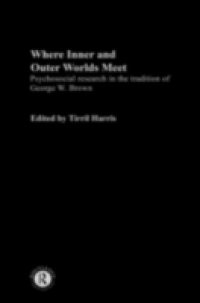The importance of George Brown's sustained contribution to medical sociology through his longitudinal studies of psychiatric disorder and its relationship to social context is widely recognised. This collection of seventeen chapters exemplifies a particular way of working as a medical sociologist which focuses on the understanding of the meaning of social experiences as the key to an individual's health status. It combines the biographical richness of qualitative analysis and thus reach conclusions on the basis of statistical significance. The contributors mainly focus on conditions of depression and anxiety, relating these to the meanings including both demographic aspects such as gender, parity, lifestyle, employment, refugee/immigration status, humiliation, entrapment, loss and also more interpersonal stresses such as neglect, abuse and critical or unsupportive relationships. This is a book which offers a rich treasury of information for all researchers interested in understanding the complex relationship between our inner and outer worlds; it captures the essence of George Brown's unique way of working.

